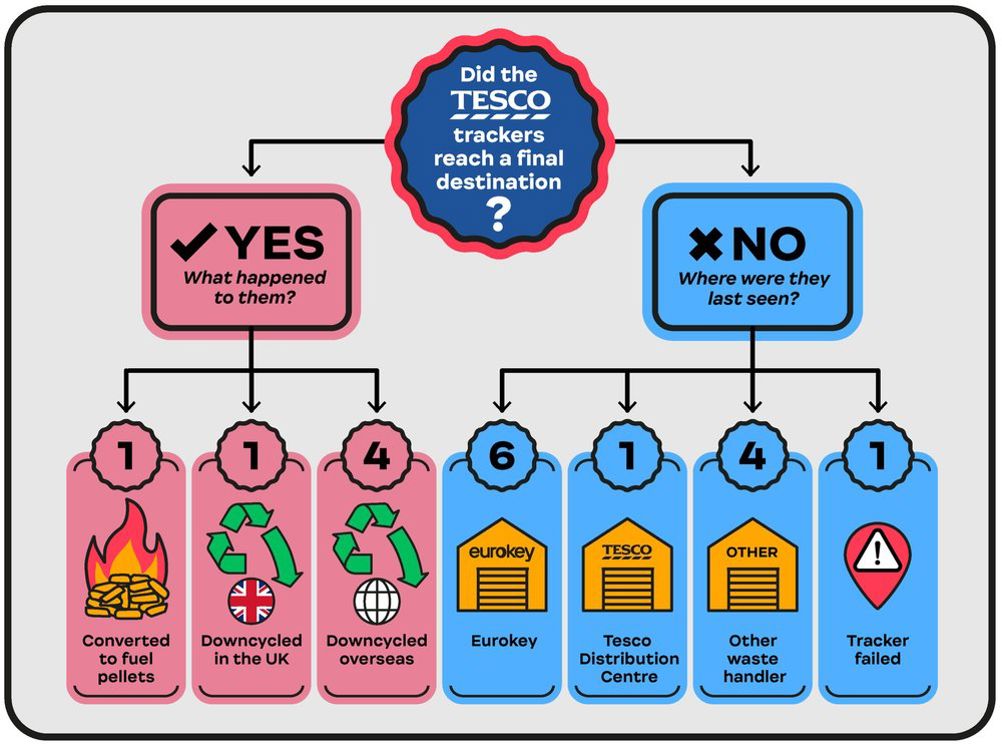Campaigning group Everyday Plastic teamed up with the Environment Investigation Agency (EIA UK) to track bundles of soft plastic waste left in take-back schemes.
Volunteers placed Apple AirTags in 40 bundles of soft plastic packaging, which were then left at front-of-store collection points in Tesco and Sainsbury’s supermarkets around England.
Major supermarkets have been rolling out recycling collection points for single-use soft plastics since 2021 and the total number is now in excess of 6,000.
Very few councils – around 12% – currently collect soft plastics in household recycling systems, according to the report.
Everyday Plastic said that collectively, the tracked bundles were found to have travelled over 25,000km across the UK and overseas.
Of the trackers that were known to have reached a final destination, it found that:
- Seven were turned into a type of fuel pellet that is commonly used in industry
- Five were burnt for energy (including two at incineration facilities in other parts of Europe)
- Four were downcycled overseas
- One was downcycled in the UK
Alison Colclough, Research Director at Everyday Plastic commented: “Our trackers reveal the hard truth about soft plastic recycling schemes at supermarkets – soft plastic packaging is not getting recycled.
“The majority of the bundles of soft plastic we tracked ended up being burned for energy recovery – a solution that is being deployed more and more in order to deal with the unmanageable amount of plastic waste.”
She said that supermarkets, waste companies and the government acknowledged the significant challenges around recycling soft plastic.
“Our tracker investigation supports these claims and shows that soft plastic is extremely difficult, if not impossible, to recycle at scale. The take-back schemes are being presented as a solution, which is diverting attention from the main issue that can’t be overlooked: far too much unnecessary plastic packaging is being produced.”
Legal NGO ClientEarth warned that soft plastic recycling claims were misleading consumers about its environmental impact, and said the Competition and Markets Authority had grounds to legally challenge the claims that were being made.
“Supermarkets, fast-moving consumer goods companies and the packaging sector must be alive to this greenwashing risk,” said ClientEarth lawyer Katie-Scarlett Wetherall.
Industry and supermarkets respond
The British Plastics Federation commented: “Using plastic waste to create energy is not the optimal way of dealing with this material. We’d much rather see material kept in functional use for as long as possible.
“We ask people to remember that putting their used plastic in the appropriate recycling bin, wherever possible, is still the right thing to do to help increase recycling. Although 'closed-loop' recycling is the most desirable route, it is not feasible in all applications, sometimes due to regulations.
“Recycling plastic into other products still has great benefits in terms of saving energy and reducing the use of virgin material. It is also worth remembering that flexible (soft) plastic packaging is extremely light and resource efficient, and is excellent for keeping down emissions when transporting food and increasing the shelf life of the products inside.
“This report shows there is a clear need to increase the UK’s recycling capacity – for all plastic. We would like to see the government investing funds raised from the Plastic Packaging Tax in achieving this, and urgently taking the steps we have repeatedly outlined to encourage the growth of the UK’s ‘advanced recycling’ infrastructure, so that far more of these ‘soft’ plastics (like plastic bags and plastic films) can be recycled here too.”
A Tesco spokesperson said: “We have a clear plan to remove packaging wherever possible and reducing, reusing and recycling it where we can't.
“Given the challenges of collecting soft plastics at kerbside, we have soft plastics collection points in our stores for customers. We work hard to recycle the materials we collect, for example our Bags for Life, and in some cases we are even able to use it for projects such as fruit and vegetable planters donated to schools or park benches donated to the NHS.
"Where it is not possible to recycle the collected plastic, we put it to alternative uses to avoid these materials going to landfill, for example using it for energy recovery.
"We know there is a lot more progress to be made, and the infrastructure to recycle soft plastics at scale in the UK and the EU still has a way to go. We are committed to working constructively with the industry and government to find new solutions for all materials, including those previously considered waste.”

A Sainsbury’s spokesperson said: “We’re always seeking ways to positively manage the end-of-life of our packaging. Our ‘Return to Store recycling scheme’ provides the opportunity to recycle more soft plastic until kerbside collection becomes available in 2026/27.
“We collect a small volume of flexible plastic overall in-store. The majority is in good condition and so is recycled. However, when materials are soiled or damaged, then they may need to be converted for energy, which is managed by our supplier.
“Feedback is important to us and we’d welcome any suggestions on how we can improve our efforts in this area.”

Everyday Plastic and EIA UK have produced a summary and full report into their investigation.
They have called for the UK Government to support a cut in global plastic production by 40% by 2040 at the upcoming Global Plastics Treaty negotiations “and beyond”, and have also called on Sainsbury’s and Tesco to publicly support this.










